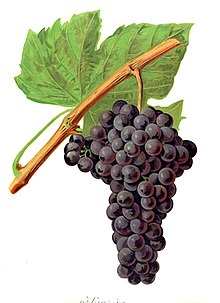Sezão
| Sezão | |
|---|---|
| Grape (Vitis) | |
 Souzão in Viala & Vermorel | |
| Color of berry skin | Noir |
| Species | Vitis vinifera |
| Origin | Portugal |
| VIVC number | 13100 |

Sezão (Spanish: Sousón), formerly known as Souzão, is a Portuguese wine grape that is used in the production of port wine and table wines.
Genetic distinction between Souzão and Vinhão
[edit]The names Souzão and Vinhão were once used as synonyms for the same variety, but recent research has shown that while they are genetically close, they are two distinct varieties.[1] For this reason, the name has been changed to Sezão and formally registered this way in Portugal's Coleção Ampelográfica Nacional (National Ampelographic Collection).[2]
Usage in wine
[edit]While originating in the Minho region, it is used primarily in Australia, California and South Africa. Sezão is also an authorized grape in the Monterrei DO in Galicia. In Portugal, it is also an authorized planting in the Douro, and Dão-Lafões area (Vinho do Dão). It shows up as a key player in Quinto do Noval's Nacional. The grape is known for the deep color it produces in a wine as well as its rustic and raisiny taste.[3]
In Australia, Sezão is used to make port-style wines and also table wines, often blended with other Portuguese grape varieties.
In South Africa, it is regarded as one of the better fortified-wine varieties for its high sugar levels and deep color.[4]
Synonyms
[edit]Sousão, Sousão de Comer, Sousão Forte, Sousão Vermelho and Souzão
See also
[edit]References
[edit]- ^ Castro, Isauro, Olinda Pinto-Carnide, Jesús-María Ortiz, Vanessa Ferreira and Juan Pedro Martín. "A comparative analysis of genetic diversity in Portuguese grape germplasm from ampelographic collections fit for quality wine production." Spanish Journal of Agricultural Research, Volume 14, Issue 4, 2016. pp. 1-11. [1] Available online at ResearchGate.[2] Accessed 3 January 2021.
- ^ Cunha, Jorge Manuel Martins, João Brazão, Margarida Teixeira-Santos, José Eduardo Eiras-Dias, P. Fevereiro, Jose Miguel Martinez-Zapater et al. "A identidade das castas de videira portuguesas aptas à produção de vinho no contexto ibérico e europeu. O uso de marcadores moleculares do tipo SNP para a sua discriminação" (The identity of Portuguese grape varieties suitable for wine production in the Iberian and European context. The use of molecular markers of the SNP type for their discrimination), Instituto Nacional de Investigação Agrária e Veterinãria (National Institute for Agricultural and Veterinary Research or INIAV), January/February/March 2017. p. 23. Available online at[3].Accessed 24 December 2020.)
- ^ J. Robinson Vines, Grapes & Wines p. 217 Mitchell Beazley 1986 ISBN 1-85732-999-6
- ^ Clarke, Oz; Rand, Margaret (2015). Grapes & wines: a comprehensive guide to varieties and flavours (completely revised ed.). New York: Sterling Epicure. ISBN 9781454915980. OCLC 889182873.


 French
French Deutsch
Deutsch